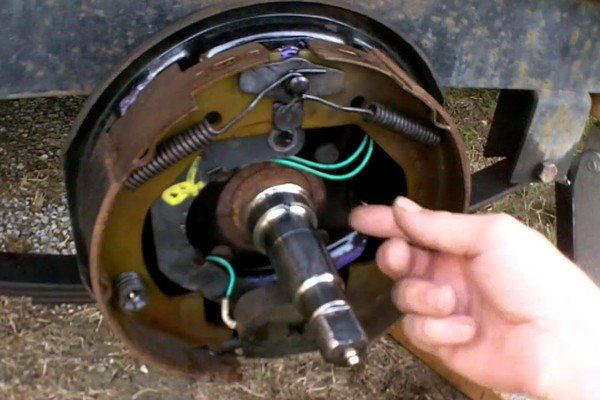how does electric brakes work on a trailer
Do you ever find yourself in a frustrating situation where your trailer brakes just won't cooperate? We've all been there, struggling to figure out why our trailer brakes are locked up and refusing to do their job. Well, worry no more! In this post, we will dive deep into diagnosing the causes of locked up trailer brakes on 7-way connectors and learn how electric trailer brakes work.
Diagnosing the Causes of Locked Up Trailer Brakes on 7-Way Connectors
When it comes to trailer brakes, a 7-way connector plays a crucial role. It provides the necessary electrical connection between your tow vehicle and trailer, allowing the braking system to function properly. However, several issues can cause your trailer brakes to lock up, leaving you puzzled and stranded. Let's explore some of the common culprits behind this vexing problem.
Improper Brake Adjustment
One of the primary reasons for locked up trailer brakes is improper brake adjustment. If your brakes are incorrectly adjusted, they can apply too much force, causing them to seize up. To avoid this, it's essential to regularly inspect and adjust your trailer brakes according to the manufacturer's recommendations.

Additionally, factors like humidity and temperature can affect the brake adjustment, so keep an eye on these variables as well. Remember, maintaining properly adjusted trailer brakes is paramount to ensure a safe and smooth towing experience.
Faulty Wiring or Connectors
Another culprit for trailer brakes locking up is faulty wiring or connectors. Over time, the wires connecting your tow vehicle's electrical system to the trailer's brakes may wear out, become loose, or get damaged. This can result in a loss of current and cause your trailer brakes to malfunction.
Regularly inspecting the wiring and connectors is crucial to detect any signs of damage or wear. If you notice any issues, it is recommended to replace the faulty parts promptly. It's also a good practice to keep your wiring connections clean and well-protected from moisture and dirt.
Corrosion in the Brake System
Corrosion can be a silent enemy that wreaks havoc on your trailer's braking system. Moisture and road debris can cause rust and corrosion to develop in various components, including the brake shoes, drums, and hydraulic lines.

Regularly inspecting and maintaining your trailer's brake system can help prevent corrosion-related issues. It's crucial to clean and lubricate the moving parts, check for signs of rust, and replace any corroded components. By keeping your brakes free from corrosion, you can avoid the frustration of locked up trailer brakes.
Low Brake Fluid
Inadequate brake fluid levels can also play a role in causing your trailer brakes to lock up. Brake fluid is responsible for transmitting the force from the brake pedal to the brake system, enabling it to function properly. If the fluid levels are low, the hydraulic pressure required for the brakes to release may not be sufficient, resulting in a locked up condition.
Regularly checking the brake fluid levels and topping them up when needed is essential to prevent this issue. If you notice a significant drop in fluid levels, it's crucial to investigate for potential leaks or other underlying problems.
How Electric Trailer Brakes Work
Now that we have covered the causes of locked up trailer brakes, let's delve into how electric trailer brakes actually work. Understanding the working principles of electric trailer brakes can help you diagnose problems more effectively and maintain your brakes for optimal performance.
Electric trailer brakes work on the principle of electromagnetism. When you apply the brakes in your tow vehicle, an electrical current is sent to the brakes on your trailer through the 7-way connector. This electrical current energizes an electromagnet inside the brake assembly, causing it to attract and engage with the brake drum.
As the electromagnet engages, it creates friction between the brake shoes and the brake drum, resulting in the trailer's deceleration. The more current sent to the brake magnets, the more braking force is applied. To adjust the braking intensity, you can use a brake controller in your tow vehicle, which regulates the current sent to the trailer brakes.
The engagement and disengagement of the brake magnets are controlled by a breakaway switch, which is a safety feature that activates the brakes if your trailer becomes disconnected from the tow vehicle. In such a scenario, the breakaway switch sends an electrical signal to the brake magnets, causing them to engage and bring the trailer to a controlled stop.
It's essential to understand the working principles of electric trailer brakes as it enables you to troubleshoot issues effectively. If you encounter brake problems, you can follow the troubleshooting steps in your trailer's manual or seek professional help if needed.
In conclusion, diagnosing the causes of locked up trailer brakes on 7-way connectors can be a challenging task. However, by understanding common culprits like improper brake adjustment, faulty wiring or connectors, corrosion, and low brake fluid levels, you can take proactive measures to prevent these issues and ensure your trailer brakes work flawlessly.
Remember, regular maintenance, inspections, and cleaning are key to keeping your trailer brakes in optimal condition. By being attentive to your brake system's needs and understanding how electric trailer brakes work, you can enjoy safe and stress-free towing experiences. Happy trails!

